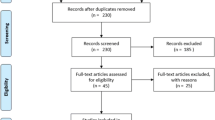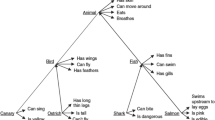Abstract
Open-ended tasks are rarely used to investigate cognition in autism. No known studies have directly examined whether increased attention to the perceptual level of speech in autism might contribute to a reduced tendency to process language meaningfully. The present study investigated linguistic versus perceptual speech processing preferences. Children with autism and controls were tested on a quasi-open-format paradigm, in which speech stimuli contained competing linguistic and perceptual information, and could be processed at either level. Relative to controls, children with autism exhibited superior perceptual processing of speech. However, whilst their tendency to preferentially process linguistic rather than perceptual information was weaker than that of controls, it was nevertheless their primary processing mode. Implications for language acquisition in autism are discussed.



Similar content being viewed by others
References
American Psychiatric Association. (1994). Diagnostic and statistical manual for mental disorders (4th ed.). Washington, DC: APA.
Baltaxe, C. A. M., & Simmons, J. Q. (1985). Prosodic development in normal, autistic children. In E. Schopler, & G. Mesibov (Eds.), Communication problems in autism (pp. 95–125). New York: Plenum Press.
Boddaert, N., Chabane, N., Belin, P., Bourgeois, M., Royer, V., Barthélémy, C., Mouren-Simeoni, M.-C., Philippe, A., Brunelle, F., Samson, Y., & Zilbovicius, M. (2004). Perception of complex sounds in autism: Abnormal auditory cortical processing in children. American Journal of Psychiatry, 161, 2117–2120.
Boersma, P. (2001). PRAAT, a systems for doing phonetics by computer. Glot International, 5 (9/19), 341–345. (http://www.praat.org/).
Boucher, J. (2003). Language development in autism. International Journal of Pediatric Otorhinolaryngology, 67S1, 159–163.
Bowler, D. M., Matthews, N. J., & Gardiner, J. M. (1997). Asperger’s syndrome and memory: Similarity to autism but not amnesia. Neuropsychologia, 35, 65–70.
Dawson, G., Meltzoff, A., Osterling, J., Rinaldi, J., & Brown, E. (1998). Children with autism fail to orient to naturally occurring social stimuli. Journal of Autism and Developmental Disorders, 28, 479–485.
Dunn, L. M., & Dunn, L. M. (1981). Peabody picture vocabulary test-revised. Minnesota: American Guidance Service.
Dunn, L. M., Whetton, C., & Pintilie, D. (1997). British picture vocabulary scale. Windsor: NFER-Nelson.
Fernald, A. (1985). Four-month-old infants prefer to listen to motherese. Infant Behavior and Development, 8, 181–195.
Fernald, A., & Kuhl, P. K. (1987). Acoustic determinants of infant preference for motherese speech. Infant Behavior and Development, 10, 279–293.
Frith, U. (1989). Autism: Explaining the enigma. Oxford: Blackwell.
Frith, U., & Snowling, M. (1983). Reading for meaning and reading for sound in autistic and dyslexic children. Journal of Developmental Psychology, 1, 329–342.
Gervais, H., Belin, P., Boddaert, N., Leboyer, M., Coez, A., Sfaello, I., Barthélémy, C., Brunelle, F., Samson, Y., & Zilbovicius, M. (2004). Abnormal cortical voice processing in autism. Nature Neuroscience, 7, 801–802.
Gillberg, C., & Coleman, M. (2000). The biology of the autistic syndromes (3rd ed.). London: Mac Keith Press.
Happé, F. (1994). An advanced test of theory of mind: understanding of story characters’ thoughts and feelings in able autistic, mentally handicapped, and normal children and adults. Journal of Autism and Developmental Disorders, 24, 129–154.
Happé, F. (1997). Central coherence and theory of mind in autism: Reading homographs in context. British Journal of Developmental Psychology, 15, 1–12.
Happé, F. (1999). Autism: Cognitive deficit or cognitive style? Trends in Cognitive Sciences, 3, 216–222.
Happé, F., & Frith, U. (2006). The weak coherence account: Detail-focused cognitive style in autism spectrum disorders. Journal of Autism and Developmental Disorders, 1, 1–21.
Heaton, P., Hermelin, B., & Pring, L. (1998). Autism and pitch processing: A precursor for savant musical ability? Music Perception, 15, 291–305.
Heaton, P. (2003). Pitch memory, labelling and disembedding in autism. Journal of Child Psychology and Psychiatry, 44, 1–9.
Heaton, P. (2005). Interval and contour processing in autism. Journal of Autism and Developmental Disorders, 8, 1–7.
Hermelin, B., & O’Connor, N. (1967). Remembering of words by psychotic and normal children. British Journal of Psychology, 58, 213–218.
Järvinen-Pasley, A., & Heaton, P. (accepted for publication). Evidence for reduced domain-specificity in auditory processing in autism. Developmental Science.
Järvinen-Pasley, A., Wallace, G. L., Ramus, F., Happé, F., & Heaton, P. (accepted for publication). Enhanced perceptual processing of speech in autism. Developmental Science.
Jolliffe, T., & Baron-Cohen, S. (1999). A test of central coherence theory: Linguistic processing in high-functioning adults with autism or Asperger syndrome: is local coherence impaired? Cognition, 71, 149–185.
Jolliffe, T., & Baron-Cohen, S. (2000). Linguistic processing in high-functioning adults with autism or Asperger’s syndrome: Is global coherence impaired? Psychological Medicine, 30, 1169–1187.
Kjelgaard, M., & Tager-Flusberg, H. (2001). An investigation of language impairment in autism: Implications for genetic subgroups. Language and Cognitive Processes, 16, 287–308.
Klin A. (1991). Young autistic children’s listening preferences in regard to speech: A possible characterisation of the symptom of social withdraw. Journal of Autism and Developmental Disorders, 21, 29–42.
Klinger, L., Dawson, G., Renner, P. (2002). Autistic disorder. In E. Mash, & R. Barkley (Eds.), Child psychopathology (2nd ed., pp. 409–454). New York: Guilford Press.
Kuhl, P. K., Coffey-Corina, S., Padden, D., & Dawson, G. (2005). Links between social and linguistic processing of speech in preschool children with autism: Behavioral and electrophysiological measures. Developmental Science, 8, F9–F20.
Kujala, T., Lepistö, T., Nieminen-von Wendt, T., Näätänen, P., & Näätänen, R. (2005). Neurophysiological evidence for cortical discrimination impairment of prosody in Asperger syndrome. Neuroscience Letters, 383, 260–265.
Lepistö, T., Kujala, T., Vanhala, R., Alku, P., Huotilainen, M., & Näätänen, R. (2005). The discrimination of and orienting to speech and non-speech sounds in children with autism. Brain Research, 1066, 147–157.
Lieberman, P. (1960). Some acoustic correlates of word stress in American English. Journal of the Acoustical Society of America, 32, 451–454.
López, B., & Leekam, S. R. (2003). Do children with autism fail to process information in context? Journal of Child Psychology and Psychiatry, 44, 285–300.
Lord, C., & Paul, R. (1997). Language and communication in autism. In D. J. Cohen, &F. R. Volkmar (Eds.), Handbook of autism and pervasive developmental disorders (2nd ed., pp. 195–225). New York: Wiley.
McCann, J., & Peppé, S. (2003). Prosody in autism spectrum disorders: A critical review. International Journal of Language and Communication Disorders, 38, 325–350.
Mottron, L. (2004). Matching strategies in cognitive research with individuals with high-functioning autism: Current practices, instrument biases, and recommendations. Journal of Autism and Developmental Disorders, 34, 19–27.
Mottron, L., Peretz, I., & Ménard, E. (2000). Local and global processing of music in high-functioning persons with autism: Beyond central coherence? Journal of Child Psychology and Psychiatry, 41, 1057–1065.
Mottron, L., & Burack, J. (2001). Enhanced perceptual functioning in the development of persons with autism. In J. Burack, T. Charman, N. Yirmiya, & P. R. Zelazo (Eds.), The development of autism: Perspectives from theory and research (pp. 131–148). Mahwah, NJ: Erlbaum.
Mottron, L., Morasse, K., & Belleville, S. (2001). A study of memory functioning in individuals with autism. Journal of Child Psychology and Psychiatry, 42, 253–260.
Mottron, L., Dawson, M., Soulières, I., Hubert, B., & Burack, J. (2006). Enhanced perceptual functioning in autism: An update, and eight principles of autistic perception. Journal of Autism and Developmental Disorders, 2, 1–17.
Norbury, C. F., & Bishop, D. M. V. (2002). Inferential processing of story recall in children with communication problems: A comparison of specific language impairment, pragmatic language impairment and high-functioning autism. International Journal of Language and Communication Disorders, 37, 227–251.
Paul, R., Augustyn, A., Klin, A., & Volkmar, F. R. (2005a). Perception and production of prosody by speakers with autism spectrum disorder. Journal of Autism and Developmental Disorders, 35, 205–220.
Paul, R., Shriberg, L. D., McSweeny, J., Cicchetti, D., Klin, A., & Volkmar, F. (2005b). Brief report: Relations between prosodic performance and communication and socialization ratings in high functioning speakers with autism spectrum disorders. Journal of Autism and Developmental Disorders, 35, 861–869.
Peppé, S., McCann, J., Gibbon, J., O’Hare, A., & Rutherford, M. (in press). Receptive and expressive prosodic ability in children with high-functioning autism. Journal of Speech, Language, and Hearing Research.
Raven, J. C., Court, J. H., & Raven, J. (1992). Standard progressive matrices. OUP: Oxford Psychologists Press.
Rutherford, M. D., Baron-Cohen, S., & Wheelwright, S. (2002). Reading the mind in the voice: A study with normal adults and adults with Asperger syndrome and high functioning autism. Journal of Autism and Developmental Disorders, 32, 189–194.
Simmons, J. Q., & Baltaxe, C. A. M. (1975). Language patterns of adolescent autistics. Journal of Autism and Childhood Schizophrenia, 2, 333–350.
Smith, B. J., Gardiner, J. M., & Bowler, D. M. (2007). Deficits in free recall persist in Asperger’s syndrome despite training in the use of list-appropriate training strategies. Journal of Autism and Developmental Disorders, 37, 445–454.
Snowling, M., & Frith, U. (1986). Comprehension in “hyperlexic” readers. Journal of Experimental Child Psychology, 42, 392–415.
Tager-Flusberg, H. (1991). Semantic processing in the free recall of autistic children: Further evidence for a cognitive deficit. British Journal of Developmental Psychology, 9, 417–430.
Toichi, M., & Kamio, Y. (2002). Long-term memory and levels-of-processing in autism. Neuropsychologia, 40, 964–969.
Wilson, M. D. (1988). The MRC psycholinguistic database: Machine readable dictionary, Version 2. Behavioural Research Methods, Instruments and Computers, 20, 6–11.
World Health Organization. (1993). The ICD-10 classification of mental and behavioural disorders. Geneva: World Health Organization.
Acknowledgments
This work was submitted in partial fulfilment of a Doctor of Philosophy degree at the University of London by the first author. A part of this work was presented at the University College London’s Centre for Human Communication Inaugural Conference on the Architecture of the Language Faculty in London, UK, in June 2004, and at the BPS Developmental Psychology Section Conference in Leeds, UK, In September 2004. Dr. Heaton’s work is supported by EU grant (12984) Stages in the Evolution and Development of Sign Use (SEDSU). We would like to express our warmest thanks to all the children who participated in this study, and their parents and teachers, for kind co-operation.
Author information
Authors and Affiliations
Corresponding author
Rights and permissions
About this article
Cite this article
Järvinen-Pasley, A., Pasley, J. & Heaton, P. Is the Linguistic Content of Speech Less Salient than its Perceptual Features in Autism?. J Autism Dev Disord 38, 239–248 (2008). https://doi.org/10.1007/s10803-007-0386-0
Received:
Accepted:
Published:
Issue Date:
DOI: https://doi.org/10.1007/s10803-007-0386-0




